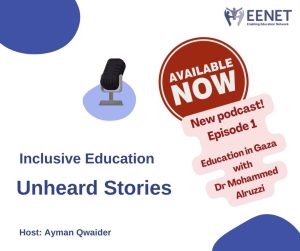Global Partnership for Education has collated a series of blogs featuring views from experts, practitioners and youth leaders on the importance of refugee-inclusive education systems that meet both immediate and long-term needs of all learners. There are five blogs with themes like lessons learned, youth perspectives on refugee education, or financing refugee inclusion.
Blog
[Blog] Refugee Children with Disabilities in Uganda: The role of mothers
In this UKFIET blog, Salome, J. Awidi writes about findings from a research project with Gulu University on the role of mothers as agents and advocates. It builds on the presentation Salome gave at the September 2023 UKFIET conference.
[Blog] International Day of Education – climate considerations
CAMFED (Campaign for Female Education) celebrated the International Day of Education (24 January) by highlighting its work on climate education. They also posted the link to the discussion between CAMFED’s CEO Angeline Murimirwa and the UK Minister of State (Development and Africa) Andrew Mitchell MP, which was released on the International Day of Education.
[Webinar] The Impact of the Nagorno Karabakh Conflict on Education
Date: 20 February 2024.
Time: 1 pm to 2 pm GMT.
Location: Faculty of Education, University of Cambridge, and online.
A seminar from REAL (Research for Equitable Access and Learning) and the Centre for Lebanese Studies. This seminar will briefly focus on the context of the conflict in Nagorno Karabakh, exploring how recent massive displacement of the Armenian population, cultural-religious identity issues, conflict and a prolonged blockade of Nagorno Karabakh affected the right to education in the region.
[Podcast] Inclusive Education: Unheard Stories – EENET
EENET’s new podcast series, hosted by Ayman Qwaider, features education stakeholders living and working in contexts where learners experience exclusion, marginalisation and oppression.
About episode 1.
Our first episode is a special two-part interview with Dr Mohammed Alruzzi. Mohammed and Ayman reflected on their experiences of education in Gaza, as learners and educators. They discussed what the education system has been like in recent decades. And, of course, they focused on the impact of the current war, which has now killed around 24,000 Palestinians (including learners and their teachers) and destroyed so much infrastructure, including schools and teaching and learning equipment/materials. What will happen to Gaza’s education system?
Listen now via SoundCloud, Spotify and YouTube.
About the podcast series.
Our podcast guests highlight the challenges learners face with accessing and participating in an inclusive, quality education. They discuss teachers and teaching, policy, attitudes, resources and funding, and much more. Guests are also invited to share their ideas for how to achieve an empowering education for everyone. You can listen on SoundCloud or Spotify and some episodes will also have a video option via YouTube.
If you would like to be interviewed for the podcast, or know someone who would, please contact us.
[Conference] BAICE Conference – call for abstracts
Deadline: Monday 11 March 2024, 5 pm (UK time).
Date of conference: 3-5 September 2024.
Location: University of Sussex, Brighton.
Conference theme: Transgression and transformation: (re)bordering education in times of conflict & crises.
BAICE (the British Association of International and Comparative Education) is calling for submissions of individual papers, symposia, workshops, posters/exhibitions and creative sessions for their upcoming conference. All BAICE members, and anyone with an interest in international and comparative education, are welcome to participate in the conference whether they submit an abstract or not.
[Webinar] Joyful Learning
Date: 30 January 2024.
Time: 4pm GMT (11am EST).
Location: online.
A webinar from the Luminos Method Series: Joyful Learning: Why children everywhere learn best when they are happy. Education experts discuss how we can build children’s love for learning and prepare them for lifelong success.
The Luminos Fund runs catch-up education programs for some of the most vulnerable children in parts of Sub-Saharan Africa and the Middle East.
[Videos] Kenyan Sign Language for children by ACD
These short YouTube videos show Kenyan Sign Language explained and used by teachers and learners. They were made for children (early years) by Action for Children with Disabilities Society. There is one introductory video for teachers, parents and deaf learners on how to use the videos and five videos explaining word groups like greetings, colours and parts of the body.
Deaf Child Worldwide shared these videos recently and we wanted to share them with you. If you know of similar resources for deaf learners, please let us know the details and links.
[Seminar series] Global injustices, conflict and education futures (23 January to 20 February 2024)
This joint REAL Centre/Centre for Lebanese Studies seminar series tackles multiple and interrelated injustices in the Global South, which manifest in war and genocide, and their interconnection with environmental degradation and resource conflict.
Check the details of each event for locations and online participation options.
- Education futures in time of genocide and precarity (23 January 2024).
- Apartheid and education in South Africa and its global forms (25 January 2024).
- Addressing (post)-colonial and Western biases in climate and sustainability (30 January 2024).
- Addressing epistemic injustice in education research and practice (6 February 2024).
- The state we are in: Sudan’s April 15th war (13 February 2024).
- The impact of the Nagorno Karabakh conflict on education (20 February 2024).
[Online course] Teaching deaf children – Deaf Child Worldwide
Dates: 26-29 February 2024.
Time: 10:00 to 12:00 GMT.
Platform: Zoom, with an online learning portal for independent study.
This free course is for educators who work with deaf children in developing countries.
Topics covered include:
- How deafness impacts language acquisition and why this has serious ongoing impacts.
- How to make schools and classrooms deaf-friendly.
- How deaf children learn, and what teaching styles and lesson adaptations work well.
Participant numbers will be limited to 20 to ensure maximum participation and learning.

